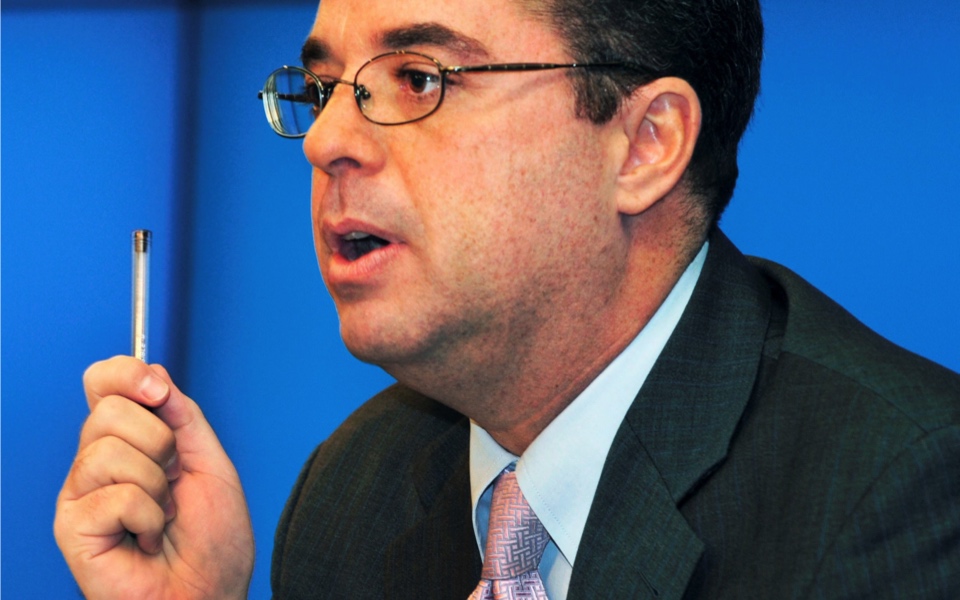Trump administration ‘decidedly pro-Turkish,’ Peter Spiegel tells Kathimerini

Few American journalists have the in-depth knowledge of Europe, Brussels and Greece required to understand what a second Trump term would mean for the Old Continent and the Eastern Mediterranean, as well as the impact of a Biden victory. Peter Spiegel is one of them. Spiegel is now US managing editor of the Financial Times; however, as the FT’s Brussels bureau chief for six years at the time of the eurozone’s big crisis, he has hands-on knowledge of the situation.
Speaking to Kathimerini in the runup to the US election, Spiegel says that a second Trump term would be disastrous for EU-US relations. He believes that Biden would do a better job at dealing with Greek-Turkish tension and expresses concern there may be an outbreak of violence if Trump loses by a small margin.
How different are these elections, taking place in the midst of a pandemic?
It’s hugely different for any number of reasons. Over the last six months, because of the pandemic, everything has become politicized. Whereas four years ago most Americans were not paying attention to the presidential race till the very end, the politics of the pandemic might have been playing out in our daily lives since March. Even things like “Should I go to a sporting event or not?” “Should I send my kid to school or not?” “Should I wear a mask or not?” – our entire lives have become politicized. If you look at the polls, [there’s] far fewer undecided voters, people feel very strongly one way or the other.
The other thing is logistics, many states had been forced to start early voting; more than half the people who voted last time have already voted and we are still four to five days before election day. It used to be on a Tuesday, which did not make a lot of sense, a lot of people could not get a day off work; there was also political apathy in the country, but now because of Covid there is a push for postal voting and early voting, suddenly participation goes up and you see queues all around the country, including in NY but also in Georgia, in Pennsylvania, in all those big swing states, where turnout helps Biden, I think, but that has been a change in America as well.
Polls since last January, even before Biden was officially declared the Democratic candidate, showed he had a seven-point lead, a nine-point lead. Is that a reliable prediction or are we going to relive 2016 when all polls missed their mark?
On the national level I’m pretty confident that the polls are pretty strong and, as you said, it’s been steady. What we forget with Trump and Hillary is that Hillary was ahead, then Trump was ahead; it depended on the latest, whether that was the Access Hollywood tape, and Hillary would go up, James Comey would be out and Trump would be back. It’s remarkably steady as you said. Even before Biden was the nominee, at least he had a 6-7% lead. It can go up to 13% in the average and has not moved at all.
Being one of the very few American journalists who knows and understands Brussels so well, can you describe what state transatlantic relations are in after four years of the Trump administration?
It’s very bad, it’s very bad, not only because Trump has picked slightly bizarre ambassadors to the EU, and describing the EU as an economic enemy, and NATO obviously, degrading it for four years, the state of transatlantic relations is as bad as it’s been frankly since WWII. The thing I would say is there is a big debate as to what extent this is reparable if Biden wins and I think there is a lot of nervousness regarding both sides for people who consider themselves Atlanticists – that there is permanent damage done and it’s not fixable. I would disagree with that and people forget that to a certain extent, when Obama came to office, we had the Pacific shift, the shift to Asia; Obama did not care about Europe anymore; he wanted to focus on Asia, this is the Pacific century, we are a Pacific nation, but as soon as a crisis happens we are like, “OK, who is our ally?” “Who shares our values?” “Who can we rely on economically, militarily, diplomatically?” It’s always Europe. I think what you will see is that an American president who comes in with a slightly more normal approach on foreign policy will inevitably gravitate back to Europe.
So, when looking at the map, and especially our region, the East Med, would Biden be someone who would care more, understand the politics of the region better?
The East Med is trickier. Turkey is a NATO ally still. But I do think that Biden by nature has come through a foreign policy tradition where he has pushed very hard for things, anti-autocracy, for lack of a better word, and Erdogan obviously is in the other camp right now. I think you will see on issues of values like democracy promotion, anti-authoritarianism, I think you would see him push rather hard on Erdogan. The other thing we know about Trump, quasi-corrupt practices by some in his inner circle have pushed forward any number of issues that are pro-Turkish in Washington, be it extraditing Gulen from Pennsylvania back to Turkey and all these kind of things. It’s been a decidedly pro-Turkish administration in that regard and I think you will see in a Biden administration much more evenhandedness when it comes to the East Med.
What is the legacy – or consequences, whatever you want to call it – of Trump’s four years in the leadership of America, the free world?
That the US as an example has been completely undermined by Trump as a person, but also the coronavirus response, in which the gold standard used to be the CDC (Centers for Disease Control and Prevention) in Atlanta, which was completely muted by the Trump administration. That sense that the US could exercise soft power as an example to other nations – I wouldn’t say it’s permanently damaged, but certainly undermined for a long time. I got to believe even a Biden administration will suffer to repair that damage.
From a European perspective – I will play devil’s advocate here – there has been a long strain in the US foreign policy that Europe doesn’t shoulder enough of its military weight. This issue that Trump talks in crude terms: You have to raise your spending; that happened under the Obama administration; that happened under the Clinton administration; that happened under Republican and Democratic administrations.
If Europe wakes up and says, “Gosh, we may be on our own. If another Trump comes around, we better get our act together on security and defense, on trade and economics,” and all those issues that Europe has muddled around with for decades now, if that is the salutary reaction, I’m not so sure it’s such a bad thing. These are issues that Europe has been struggling with for decades – they always had the American military and economic umbrella and I think the stark reality that that could be gone in one election has really forced Europe to look itself in the mirror and say, “We’ve got to take that stuff more seriously now.”
Are you worried about any violent reaction to the US election results? How possible is it that Trump won’t accept the results if he loses and what will that lead to? A call to action?
I have assigned reporters to it because I’m worried about it. There is clear evidence, we saw this incident in Michigan where there was those right-wing militia guys who were literally plotting to kidnap the governor. There is this group “True the Vote,” a very right-wing organization which has been recruiting military veterans who can serve as poll monitors. They are saying it’s not about violence, they just want to be sure. But why are they recruiting military veterans to do this? There is a lot of anecdotal evidence out there that people are waiting. A lot will come down to what the US president says on election day.
I do think that Biden’s lead will be big enough on Tuesday night that even if Trump issues a call to arms, everyone will say: “Go away. We are tired of you.” But if it’s close, [and] there are enough people who have clearly decided that they want to arm themselves, then it’s a risk and we have as a news organization implemented security measures. We are worried that the media can be targeted, and I know that goes through the mind of state and local authorities who are trying to prepare for that as well.





